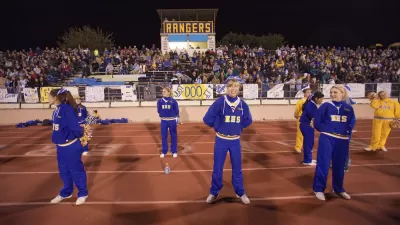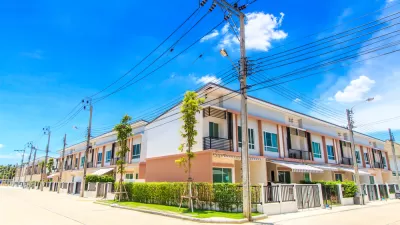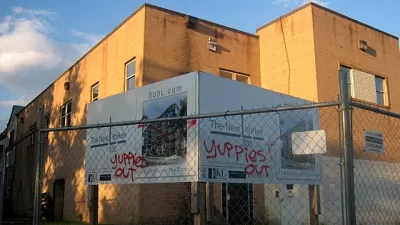Both supporters and opponents of the sprawl status quo often refer to suburbia as “The American Dream.” One sprawl-defending organization even calls itself “The American Dream Coalition.”
Both supporters and opponents of the sprawl status quo often refer to suburbia as "The American Dream." One sprawl-defending organization even calls itself "The American Dream Coalition". Sprawl critics use similar language; for example, in 1998, the Sierra Club issued a report titled "Sprawl: The Dark Side of the American Dream."
The equation of the "American Dream" with sprawl is inconsistent with the term's original meaning. The term "American Dream" was apparently invented in 1931 by historian James Truslow Adams; he was referring to "That dream of a land in which life should be better and richer and fuller for every man, with opportunity for each according to his ability or achievement." (Youngro Lee, To Dream Or Not To Dream, 16 Cornell Journal of Law and Public Policy 231, 232). Thus, the term "American Dream" means not one type of house on one type of lot, but an economy open to talent, whether in dense cities, streetcar suburbs, or small towns.
More importantly, the use of the term "American Dream" to describe just one type of development is so inconsistent with America's libertarian values as to be almost un-American.
In the Declaration of Independence, Thomas Jefferson wrote that people are "endowed by their creator with certain unalienable rights, that among these are life, liberty and the pursuit of happiness." To me, "liberty" implies some diversity of living arrangements - not just suburbs, but big cities and small, rural retreats and small towns. "Liberty" implies that Americans should be free to create Manhattan as well as Montana.
By contrast, the use of the term "American Dream" to describe the sprawl status quo implies that only one form of development is "American" - that large-lot suburbia, as the "American Dream", is what all real Americans want, and that cities and small towns and rural areas are for foreigners. There is nothing particularly libertarian about such an attitude.
Sprawl critics weaken their position by allowing their opponents to get away with such abuses of patriotism. Instead, supporters of more compact development should be reclaiming the mantle of Americanism themselves - for example, by suggesting that people are freer when they can walk as well as drive.

Maui's Vacation Rental Debate Turns Ugly
Verbal attacks, misinformation campaigns and fistfights plague a high-stakes debate to convert thousands of vacation rentals into long-term housing.

Planetizen Federal Action Tracker
A weekly monitor of how Trump’s orders and actions are impacting planners and planning in America.

In Urban Planning, AI Prompting Could be the New Design Thinking
Creativity has long been key to great urban design. What if we see AI as our new creative partner?

King County Supportive Housing Program Offers Hope for Unhoused Residents
The county is taking a ‘Housing First’ approach that prioritizes getting people into housing, then offering wraparound supportive services.

Researchers Use AI to Get Clearer Picture of US Housing
Analysts are using artificial intelligence to supercharge their research by allowing them to comb through data faster. Though these AI tools can be error prone, they save time and housing researchers are optimistic about the future.

Making Shared Micromobility More Inclusive
Cities and shared mobility system operators can do more to include people with disabilities in planning and operations, per a new report.
Urban Design for Planners 1: Software Tools
This six-course series explores essential urban design concepts using open source software and equips planners with the tools they need to participate fully in the urban design process.
Planning for Universal Design
Learn the tools for implementing Universal Design in planning regulations.
planning NEXT
Appalachian Highlands Housing Partners
Mpact (founded as Rail~Volution)
City of Camden Redevelopment Agency
City of Astoria
City of Portland
City of Laramie






























